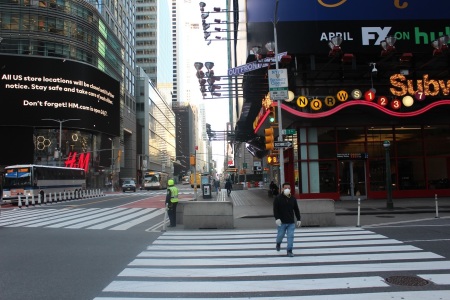End COVID lockdowns, say over 49,000 doctors and scientists

Doctors and scientists from around the world have signed a document calling for an end to COVID-19 lockdowns because of “grave concerns” over public health.
The Great Barrington Declaration argues that continued lockdowns cause health issues that outweigh the dangers of the coronavirus and calls for "focused protection." So far, 671,731 concerned citizens, 37,198 doctors and 12,512 medical and public health scientists from around the world have signed the document.
“Current lockdown policies are producing devastating effects on short and long-term public health. The results (to name a few) include lower childhood vaccination rates, worsening cardiovascular disease outcomes, fewer cancer screenings and deteriorating mental health – leading to greater excess mortality in years to come, with the working class and younger members of society carrying the heaviest burden. Keeping students out of school is a grave injustice,” the document, first published in October by Drs. Jay Bhattacharya, Sunetra Gupta and Martin Kulldorff, reads.
“Fortunately, our understanding of the virus is growing. We know that vulnerability to death from COVID-19 is more than a thousand-fold higher in the old and infirm than the young. Indeed, for children, COVID-19 is less dangerous than many other harms, including influenza.”
Because evidence now shows the virus has a minimal impact on people who are not old or infirm, governments should reopen society, the doctors argue. Old and vulnerable people should self-quarantine, and others who are not vulnerable should study, work and live life as usual.
Locking down nations has a terrible impact on the developing world, the paper’s FAQ section states. The U.N. estimates that 130 million people around the world will face starvation and an additional 400,000 will die by tuberculosis as a consequence of lockdowns. Because of COVID-19 fears, doctors have stopped worldwide vaccination campaigns for other lethal diseases.
It also argues, “Basic epidemiological theory indicates that lockdowns do not reduce the total number of cases in the long run and have never in history led to the eradication of a disease. At best, lockdowns delay the increase of cases for a finite period and at great cost."
Reopening society will allow “herd immunity” to develop, the declaration says. By allowing healthy people who have low death risks to catch the virus and keeping the vulnerable safe, nations will prevent deaths. When enough people have caught it, the virus’ rates of transmission will decrease.
“For COVID-19, all strategies lead to herd immunity, making it nonsensical to denote one specific approach as a herd immunity strategy just as it does not make sense for airplane pilots to talk about a 'gravity strategy' for safely landing a plane,” the FAQ reads.
The suggested plan doesn’t mean letting the virus spread uncontrolled and it does not advocate for people to get deliberately infected.
Retirement homes should use staff who have immunity to the virus, minimize staff rotation and test non-immune staff as well as visitors. Older people at home should have essential goods delivered and should meet with family outside. And workplace disability laws should require employers to provide reasonable accommodations to protect high COVID-19 risk workers without losing their jobs, the declaration recommends.
“Letting children and young adults live their lives without lockdown restrictions does not mean that we are letting them die from the virus, just like we do not accuse politicians for letting people die in car accidents when a new road is built,” it says. “On the contrary, the GBD reduces the considerable collateral damage for less vulnerable people who face more danger from lockdown than they do from COVID-19 infection.”





















